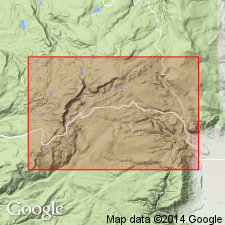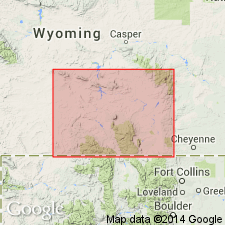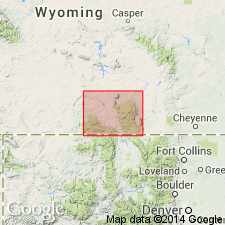
- Usage in publication:
-
- Medicine Peak metaquartzite
- Modifications:
-
- Named
- Dominant lithology:
-
- Conglomerate
- Quartzite
- AAPG geologic province:
-
- Northern Rocky Mountain region
Summary:
No type locality designated. Probably named for Medicine Bow Peak, Albany Co, WY, T16N, R79W in the Northern Rocky Mountain region. Is a coarse-grained conglomerate, very thick bedded, massive metaquartzite. Has a few slaty layers and partings. Two members recognized. The lower member is a massive, violet-gray metaquartzite 1,700 ft thick. Individual grains in lower member range from 1/2 to 3 mm in diameter. Pebbles are as much as 15 mm thick. Is cross-bedded in layers 1/2 to 1 ft thick. The upper member is unusually pure and uniform, and not as coarse as the lower member. Is mostly white. Some beds are gray or pale green. The upper member is 4,000 ft thick. Is younger than Heart metagraywacke (new); the contact is conformable. Contact with the younger Lookout schist (new) is gradational. Assigned to the pre-Cambrian; is probably early Algonkian or Proterozoic.
Source: GNU records (USGS DDS-6; Denver GNULEX).

- Usage in publication:
-
- Medicine Peak Quartzite
- Modifications:
-
- Revised
- AAPG geologic province:
-
- Northern Rocky Mountain region
Summary:
Assigned as one of eight formations of Libby Creek Group of Snowy Pass Supergroup [typo --Snowy Pass not formally introduced until 1983]. Revised in that a 17 m thick hematitic quartz pebble conglomerate that lies about 125 m below top of Medicine Peak is named Klondike Lake Conglomerate Member. The Medicine Peak: conformably overlies Heart Formation of Libby Creek; conformably overlain by Lookout Schist of Libby Creek; is about 1,700 m thick; is a cliff-forming, medium- to thick-bedded, massive to plane-bedded, medium to very coarse grained quartzite with pebbly zones and quartz-pebble conglomerate layers. Alumino-silicate minerals present may represent alteration product of feldspar. May have been more arkosic than at present. Deposited on fluvial and subtidal portion of a tidally dominated delta plain. Stratigraphic chart. Of Proterozoic age.
Source: GNU records (USGS DDS-6; Denver GNULEX).

- Usage in publication:
-
- Medicine Peak Quartzite*
- Modifications:
-
- Revised
- AAPG geologic province:
-
- Northern Rocky Mountain region
Summary:
Assigned as one of six formations to the lower part of the Libby Creek Group of the newly defined Snowy Pass Supergroup in the Medicine Bow Mountains, WY in the Northern Rocky Mountain region. Conformably overlies Heart Formation of the Libby Creek. Conformably underlies Lookout Schist of the Libby Creek. Is 1,700 m thick. Correlates with the lower part of the Copperton Formation (formerly called Copperton Quartzite) of the Snowy Pass Group of the Sierra Madre. Geologic map; correlation chart. Of Early Proterozoic age.
Source: GNU records (USGS DDS-6; Denver GNULEX).
For more information, please contact Nancy Stamm, Geologic Names Committee Secretary.
Asterisk (*) indicates published by U.S. Geological Survey authors.
"No current usage" (†) implies that a name has been abandoned or has fallen into disuse. Former usage and, if known, replacement name given in parentheses ( ).
Slash (/) indicates name conflicts with nomenclatural guidelines (CSN, 1933; ACSN, 1961, 1970; NACSN, 1983, 2005, 2021). May be explained within brackets ([ ]).

